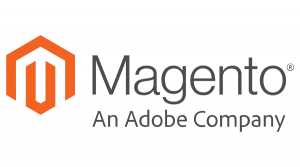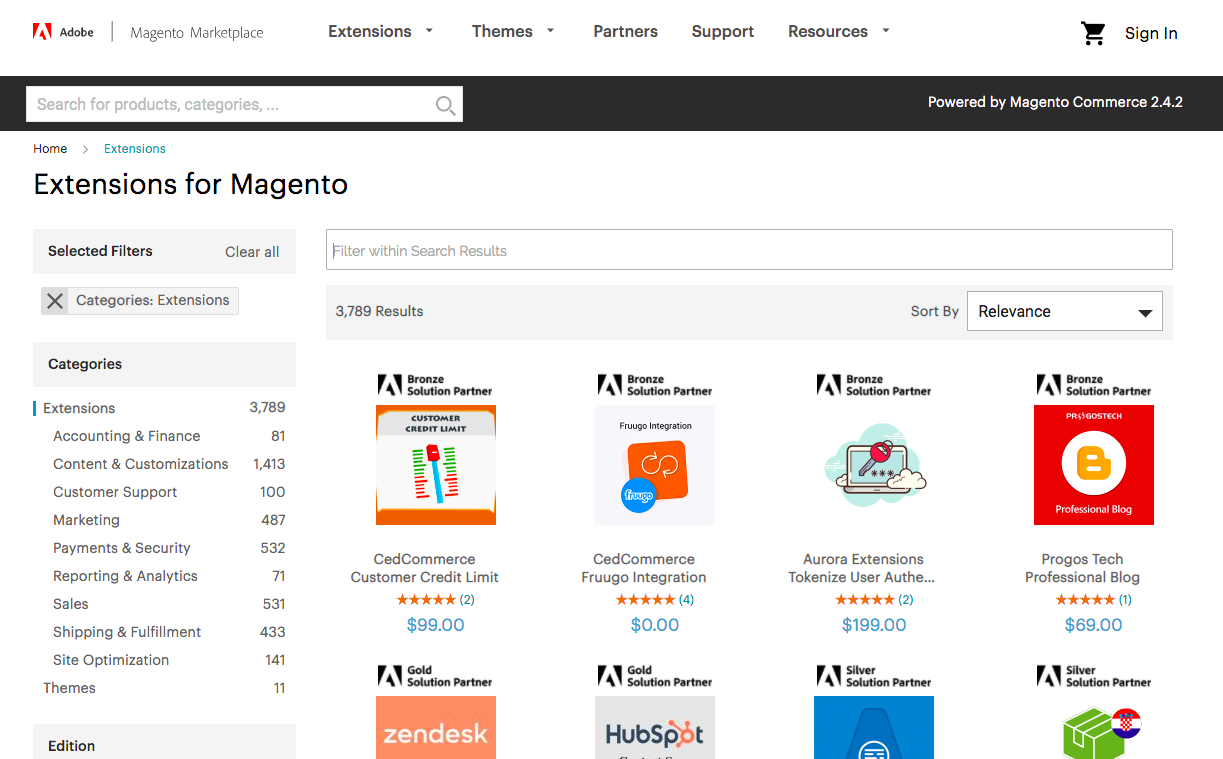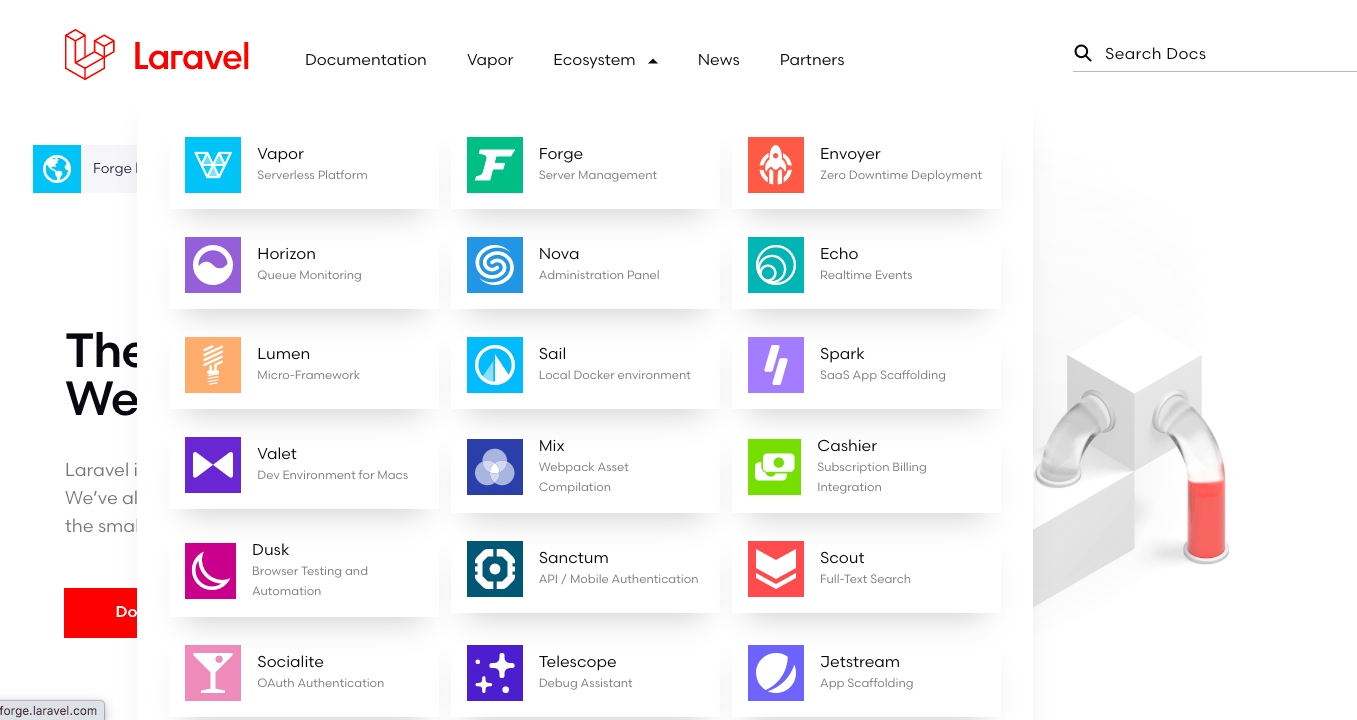Magento Vs Laravel? Anyone who is considering these 2 platforms need to read this blog right now.
When building an eCommerce website, first thing first, choosing the most suitable platform is the top of mind. It will affect your later business performance. For that reason, businesses usually spend lots of their time find the right platform.
Continue with our blog series. Today, we want to give you a detailed comparison between Magento Vs Laravel.
Now, let’s begin!
Magento Vs Laravel – A Brief Introduction
About Magento

Magento is considered the leading eCommerce platform, with more than 250,000 websites worldwide, approximately 2.5 million downloads. Initially released in 2008, Magento is an open-source platform written in PHP. Magento is familiar among eCommerce businesses, favored by most programmers.
Over a decade, Magento has proved itself in the market, providing enormous businesses with the best and modern method to succeed in the field and generate more revenue.
Magento offers 3 editions: Magento 2 Community Edition (CE), Magento 2 Enterprise Edition (EE), Magento Commerce Cloud. Among which, the first edition is FREE of charge; the other 2 are charged editions. If you want an edition with a full list of premium features, please consider Magento 2 Enterprise Edition or Magento Commerce Cloud.
About Laravel

Published a little later than Magento, but Laravel also gained its place in the market. Like Magento, it is also an open-source PHP web framework, focusing on developing web applications following the model-view-controller (MVC).
For a better understanding, a framework acts quite similar to a platform. However, a small difference is that a framework contains pre-built components that when building a website, a framework enables developers to complete a project more quickly, without redeveloping functions.
According to research, there are nearly 680.000 live websites that are using Laravel. Notably, Laravel has received prizes being one of the most popular frameworks in various countries, namely, Palestine, Mongolia, Georgia, Nepal, etc.
For that reason, Laravel is developing strongly, proving that it is a formidable competitor of Magento.
So, between these 2 robust and common platforms, which one should you choose? Scroll down to our detailed comparison for a better understanding.
Magento Vs Laravel – What Are The Differences?
This section will compare Magento vs Laravel from various perspectives, including usability, complexity, performance and scalability, pricing, community support, and many more.
Usability (Features)
Both Magento and Laravel contain a considerable number of powerful features to create an eCommerce website in any business field.
Magento and Laravel feature list:
| Magento | Laravel |
|---|---|
| Catalog management | Product Filters |
| Content management | Online payment gateways |
| Marketing support | Responsive website |
| Cart & checkout | Single-page checkout |
| Order management | Coupons & discounts |
| Customer management | Ratings & Reviews |
| Store management | SEO-friendly |
| System management | Android mobile app |
| Analytics & reporting | Multi-level categories |
| Bulk email/newsletter | |
| Product comparison |
For Magento, those above are only basic features. Besides, there are many supporting features and additional features provided by enormous extensions, which we will mention later.
And for Laravel PHP Framework, Laravel also offers a massive ecosystem with Laravel products and integrations to add more optimal features.
Therefore, in this perspective, this is an equally competitive race.
Code Complexity

Magento has been developed for over a decade; hence, it has gone through updating, modification, and correction several times. Because of this, the code has become more and more complex. Consequently, developers find it challenging to read, decode, and fault investigation or troubleshooting of the code, especially code written by someone else.
At first, Magento is quite an easy-to-use platform. But due to the code complexity, it has overshadowed such an advantage, making Magento slow and redundant.
In contrast, Laravel, with its MVC architecture, seems to be easier for developers in terms of code structure and management. Laravel uses PHP-based syntax and ORM (Object Relational Mapping)-based coding, making the database operations much more manageable. Furthermore, developers can quickly read codes written by others and timely fix issues.
All in all, in terms of code complexity, Laravel outperforms Magento.
Extensions & Integrations

We suppose that Magento is the winner in terms of extensions and integrations. Perhaps no one can beat Magento in this aspect. Magento marketplace is so huge, containing nearly 3.800 extensions and integrations developed by Magento’s partners.
Each extension and integration will offer an additional feature to the Magento default. When searching on the internet for the Magento extension with the wanted feature, countless results will appear. Besides extensions in the marketplace, there are a lot more modules provided by third parties.

Compared to Magento, Laravel’s extensions are quite limited. There are several extensions from some third parties available. But instead, Laravel has an ecosystem with various products, integrations.
Some outstanding products or integrations can be mentioned:
- Vapor: Serverless platform
- Forge: Server management
- Envoyer: Zero downtime deployment
- Horizon: Queue monitoring
- Nova: Administration panel
- Echo: Realtime events
- Lumen: Micro-framework
- Cashier: Subscription billing integration
- Dusk: Browser testing and automation
- Telescope: Debug assistant
Security

Security is considered one of the essential factors when choosing a platform. No one wants their website to easily get hacked, which is extremely dangerous for both businesses and customers.
Though Magento had to deal with security breaches in the past, after several updates, it becomes robust in terms of security. One of its core updates is releasing independent security patches, making it a perfect option for eCommerce security.
But Laravel also guarantees to secure its users. When using Laravel, the store owner can be sure about the PHP framework’s web application security. Besides, the use of hashtags, Bcrypt Hashtag Algorithm and passwords work to prevent eCommerce sites from being hacked.
Pricing
| Gross Sales Revenue | Magento Commerce (Enterprise Edition) | Magento Commerce Cloud |
|---|---|---|
| Less than $1 million | $22.000 | $40.000 |
| $1 million - $5 million | $32.000 | $55.000 |
| $5 million - $10 million | $49.000 | $80.000 |
| $10 million - $25 million | $75.000 | $120.000 |
| $25 million - $50 million | $125.000 | $190.000 |
Magento Commerce provides users with three different pricing plans for different needs. If your business is small to medium-sized, then the Magento Community Edition is for you. You are provided with the most basic functions to set up the online shop at this price plan, both for website and mobile.
When your business wants to further customize the shop and add scalability for the long term, Magento Enterprise Edition and Magento Commerce Cloud should be ideal. Based on the revenue of your store, the detailed pricing plan is stated in the table above.
Laravel Ecommerce, on the other hand, is a one-time purchase plan, so you can comfortably develop your shop without having to worry about monthly recurring payments.
Laravel pricing plan starts at $499 for Laravel Lite, and Laravel Smart price is available based on each enterprise’s needs. Laravel Lite is perfect for anyone looking to integrate essential functions to their web store, such as product filters, payment gateways, etc. And this pricing plan also gives you access to three months of technical support for free.
Moving up the ladder, Laravel Smart includes all of the Laravel Lite features. It provides you with additional payment gateways, a front-end store available, custom design, an independent admin panel, and iOS Mobile Applications. And for the Laravel Smart plan, you would need to contact the vendor to customize your specific needs and custom quote.
Support

When it comes to choosing the best Ecommerce solutions, developers’ availability is a critical factor to consider. With ready-made ecommerce solutions, many people realized that their choice does not fit their needs and requirements when it’s too late.
Therefore, developing your application with the features you want is the ideal approach, but not everyone can code and customize, so they need to ask for help from developers. And some platforms have different developers’ availability and can significantly affect how you can set up your shop.
Magento is one of the longest-standing PHP development platforms. Therefore, the support and availability of developers are undeniably higher than that of Laravel. With large communities and forums being actively contributed by senior developers, Magento community supports can help you through any issues and problems you may have during development.
Furthermore, the number of Magento developers for hire is also higher than Laravel due to its popularity (300.000 developers and 258 partners). Therefore, the pay grade of these developers is also much more reasonable.
However, Laravel is still a viable option for you if you can allocate the budget to hire PHP experts with experience and knowledge in MVC platforms to provide them with training on Laravel and learn the technology.
Magento Vs Laravel – Which One Is Better?

So the question is, which one is better? We guess that it depends on specific demands, business size, type, and field.
With a vast supporting community and developers’ availability, robust and premium features, Magento might be more suitable for medium to large-size enterprises. Such enterprises have a huge inventory, high budget and advanced technical skills to deal with complicated coding.
Because of its advantages, such as ORM-based data, simple coding style, MVC architecture, and Laravel, Laravel is also the best-preferred open-source platform. Laravel is well-known mostly among small and medium enterprises (SMEs) with low budgets but still want to find a good enough framework to build an eCommerce site.
Final Thoughts

Above is our comparison between Magento vs Laravel in detail. Through this blog post, we hope that you can choose the most suitable platform for your business.
If you want us to compare Magento with any other platform, please comment in the section below. We will provide as soon as possible.
Thanks a lot for reading!

